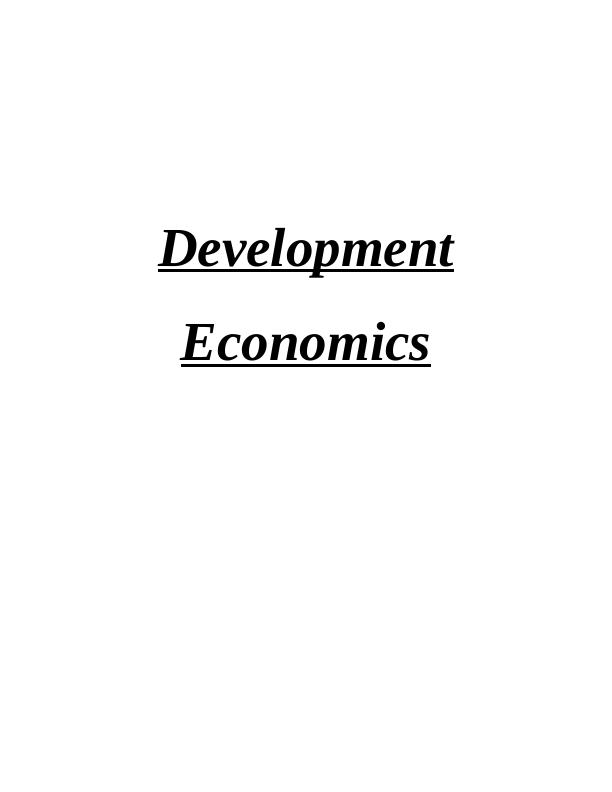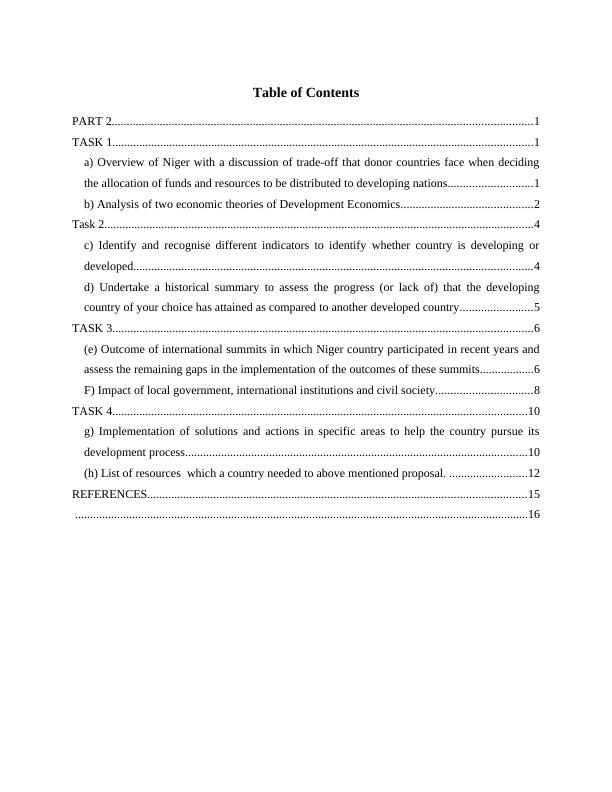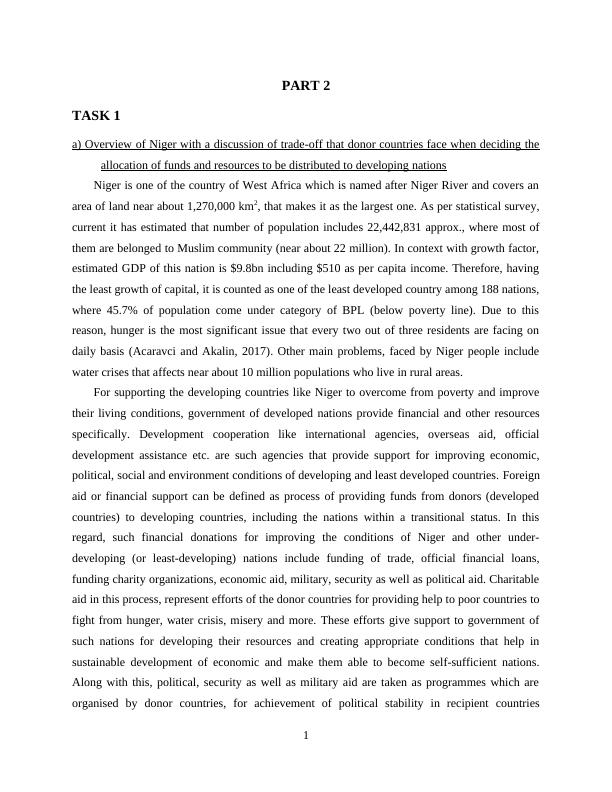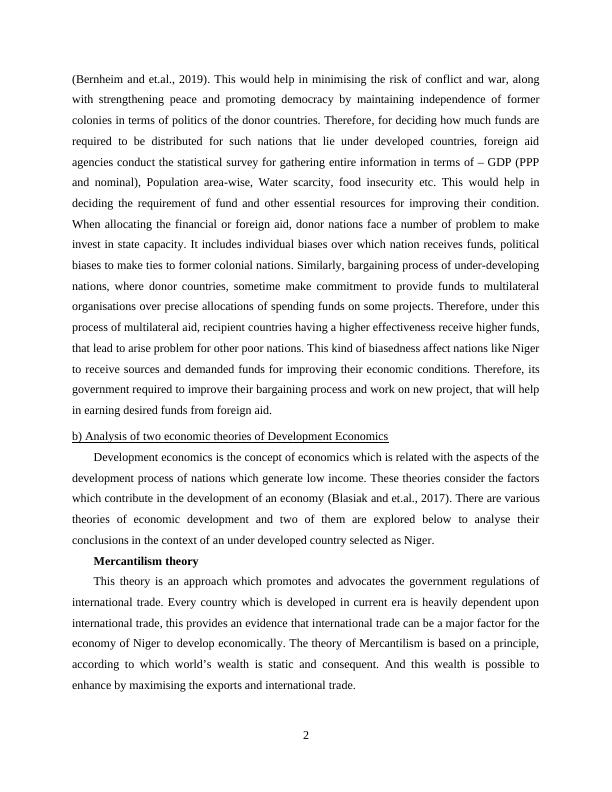Development Economics: Overview of Niger and Economic Theories
Added on 2023-01-13
18 Pages6588 Words97 Views
Development
Economics
Economics

Table of Contents
PART 2............................................................................................................................................1
TASK 1............................................................................................................................................1
a) Overview of Niger with a discussion of trade-off that donor countries face when deciding
the allocation of funds and resources to be distributed to developing nations............................1
b) Analysis of two economic theories of Development Economics............................................2
Task 2...............................................................................................................................................4
c) Identify and recognise different indicators to identify whether country is developing or
developed.....................................................................................................................................4
d) Undertake a historical summary to assess the progress (or lack of) that the developing
country of your choice has attained as compared to another developed country........................5
TASK 3............................................................................................................................................6
(e) Outcome of international summits in which Niger country participated in recent years and
assess the remaining gaps in the implementation of the outcomes of these summits..................6
F) Impact of local government, international institutions and civil society................................8
TASK 4..........................................................................................................................................10
g) Implementation of solutions and actions in specific areas to help the country pursue its
development process..................................................................................................................10
(h) List of resources which a country needed to above mentioned proposal. ..........................12
REFERENCES..............................................................................................................................15
.......................................................................................................................................................16
PART 2............................................................................................................................................1
TASK 1............................................................................................................................................1
a) Overview of Niger with a discussion of trade-off that donor countries face when deciding
the allocation of funds and resources to be distributed to developing nations............................1
b) Analysis of two economic theories of Development Economics............................................2
Task 2...............................................................................................................................................4
c) Identify and recognise different indicators to identify whether country is developing or
developed.....................................................................................................................................4
d) Undertake a historical summary to assess the progress (or lack of) that the developing
country of your choice has attained as compared to another developed country........................5
TASK 3............................................................................................................................................6
(e) Outcome of international summits in which Niger country participated in recent years and
assess the remaining gaps in the implementation of the outcomes of these summits..................6
F) Impact of local government, international institutions and civil society................................8
TASK 4..........................................................................................................................................10
g) Implementation of solutions and actions in specific areas to help the country pursue its
development process..................................................................................................................10
(h) List of resources which a country needed to above mentioned proposal. ..........................12
REFERENCES..............................................................................................................................15
.......................................................................................................................................................16

PART 2
TASK 1
a) Overview of Niger with a discussion of trade-off that donor countries face when deciding the
allocation of funds and resources to be distributed to developing nations
Niger is one of the country of West Africa which is named after Niger River and covers an
area of land near about 1,270,000 km2, that makes it as the largest one. As per statistical survey,
current it has estimated that number of population includes 22,442,831 approx., where most of
them are belonged to Muslim community (near about 22 million). In context with growth factor,
estimated GDP of this nation is $9.8bn including $510 as per capita income. Therefore, having
the least growth of capital, it is counted as one of the least developed country among 188 nations,
where 45.7% of population come under category of BPL (below poverty line). Due to this
reason, hunger is the most significant issue that every two out of three residents are facing on
daily basis (Acaravci and Akalin, 2017). Other main problems, faced by Niger people include
water crises that affects near about 10 million populations who live in rural areas.
For supporting the developing countries like Niger to overcome from poverty and improve
their living conditions, government of developed nations provide financial and other resources
specifically. Development cooperation like international agencies, overseas aid, official
development assistance etc. are such agencies that provide support for improving economic,
political, social and environment conditions of developing and least developed countries. Foreign
aid or financial support can be defined as process of providing funds from donors (developed
countries) to developing countries, including the nations within a transitional status. In this
regard, such financial donations for improving the conditions of Niger and other under-
developing (or least-developing) nations include funding of trade, official financial loans,
funding charity organizations, economic aid, military, security as well as political aid. Charitable
aid in this process, represent efforts of the donor countries for providing help to poor countries to
fight from hunger, water crisis, misery and more. These efforts give support to government of
such nations for developing their resources and creating appropriate conditions that help in
sustainable development of economic and make them able to become self-sufficient nations.
Along with this, political, security as well as military aid are taken as programmes which are
organised by donor countries, for achievement of political stability in recipient countries
1
TASK 1
a) Overview of Niger with a discussion of trade-off that donor countries face when deciding the
allocation of funds and resources to be distributed to developing nations
Niger is one of the country of West Africa which is named after Niger River and covers an
area of land near about 1,270,000 km2, that makes it as the largest one. As per statistical survey,
current it has estimated that number of population includes 22,442,831 approx., where most of
them are belonged to Muslim community (near about 22 million). In context with growth factor,
estimated GDP of this nation is $9.8bn including $510 as per capita income. Therefore, having
the least growth of capital, it is counted as one of the least developed country among 188 nations,
where 45.7% of population come under category of BPL (below poverty line). Due to this
reason, hunger is the most significant issue that every two out of three residents are facing on
daily basis (Acaravci and Akalin, 2017). Other main problems, faced by Niger people include
water crises that affects near about 10 million populations who live in rural areas.
For supporting the developing countries like Niger to overcome from poverty and improve
their living conditions, government of developed nations provide financial and other resources
specifically. Development cooperation like international agencies, overseas aid, official
development assistance etc. are such agencies that provide support for improving economic,
political, social and environment conditions of developing and least developed countries. Foreign
aid or financial support can be defined as process of providing funds from donors (developed
countries) to developing countries, including the nations within a transitional status. In this
regard, such financial donations for improving the conditions of Niger and other under-
developing (or least-developing) nations include funding of trade, official financial loans,
funding charity organizations, economic aid, military, security as well as political aid. Charitable
aid in this process, represent efforts of the donor countries for providing help to poor countries to
fight from hunger, water crisis, misery and more. These efforts give support to government of
such nations for developing their resources and creating appropriate conditions that help in
sustainable development of economic and make them able to become self-sufficient nations.
Along with this, political, security as well as military aid are taken as programmes which are
organised by donor countries, for achievement of political stability in recipient countries
1

(Bernheim and et.al., 2019). This would help in minimising the risk of conflict and war, along
with strengthening peace and promoting democracy by maintaining independence of former
colonies in terms of politics of the donor countries. Therefore, for deciding how much funds are
required to be distributed for such nations that lie under developed countries, foreign aid
agencies conduct the statistical survey for gathering entire information in terms of – GDP (PPP
and nominal), Population area-wise, Water scarcity, food insecurity etc. This would help in
deciding the requirement of fund and other essential resources for improving their condition.
When allocating the financial or foreign aid, donor nations face a number of problem to make
invest in state capacity. It includes individual biases over which nation receives funds, political
biases to make ties to former colonial nations. Similarly, bargaining process of under-developing
nations, where donor countries, sometime make commitment to provide funds to multilateral
organisations over precise allocations of spending funds on some projects. Therefore, under this
process of multilateral aid, recipient countries having a higher effectiveness receive higher funds,
that lead to arise problem for other poor nations. This kind of biasedness affect nations like Niger
to receive sources and demanded funds for improving their economic conditions. Therefore, its
government required to improve their bargaining process and work on new project, that will help
in earning desired funds from foreign aid.
b) Analysis of two economic theories of Development Economics
Development economics is the concept of economics which is related with the aspects of the
development process of nations which generate low income. These theories consider the factors
which contribute in the development of an economy (Blasiak and et.al., 2017). There are various
theories of economic development and two of them are explored below to analyse their
conclusions in the context of an under developed country selected as Niger.
Mercantilism theory
This theory is an approach which promotes and advocates the government regulations of
international trade. Every country which is developed in current era is heavily dependent upon
international trade, this provides an evidence that international trade can be a major factor for the
economy of Niger to develop economically. The theory of Mercantilism is based on a principle,
according to which world’s wealth is static and consequent. And this wealth is possible to
enhance by maximising the exports and international trade.
2
with strengthening peace and promoting democracy by maintaining independence of former
colonies in terms of politics of the donor countries. Therefore, for deciding how much funds are
required to be distributed for such nations that lie under developed countries, foreign aid
agencies conduct the statistical survey for gathering entire information in terms of – GDP (PPP
and nominal), Population area-wise, Water scarcity, food insecurity etc. This would help in
deciding the requirement of fund and other essential resources for improving their condition.
When allocating the financial or foreign aid, donor nations face a number of problem to make
invest in state capacity. It includes individual biases over which nation receives funds, political
biases to make ties to former colonial nations. Similarly, bargaining process of under-developing
nations, where donor countries, sometime make commitment to provide funds to multilateral
organisations over precise allocations of spending funds on some projects. Therefore, under this
process of multilateral aid, recipient countries having a higher effectiveness receive higher funds,
that lead to arise problem for other poor nations. This kind of biasedness affect nations like Niger
to receive sources and demanded funds for improving their economic conditions. Therefore, its
government required to improve their bargaining process and work on new project, that will help
in earning desired funds from foreign aid.
b) Analysis of two economic theories of Development Economics
Development economics is the concept of economics which is related with the aspects of the
development process of nations which generate low income. These theories consider the factors
which contribute in the development of an economy (Blasiak and et.al., 2017). There are various
theories of economic development and two of them are explored below to analyse their
conclusions in the context of an under developed country selected as Niger.
Mercantilism theory
This theory is an approach which promotes and advocates the government regulations of
international trade. Every country which is developed in current era is heavily dependent upon
international trade, this provides an evidence that international trade can be a major factor for the
economy of Niger to develop economically. The theory of Mercantilism is based on a principle,
according to which world’s wealth is static and consequent. And this wealth is possible to
enhance by maximising the exports and international trade.
2

End of preview
Want to access all the pages? Upload your documents or become a member.
Related Documents
A Study on Community Development Theory and Practiceslg...
|12
|2929
|168
Role of the Marshall Plan in Europe’s Economic Developmentlg...
|10
|2773
|84
Political, Social and Economic Construction PDFlg...
|13
|3440
|84
Characteristics and issues Factsheet – Nepallg...
|7
|1391
|54
Economic and Financial Management- PDFlg...
|9
|2471
|277
Healthcare Financing in LMICs and Achieving UHClg...
|15
|3895
|318
